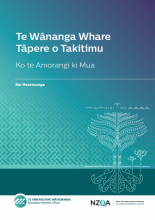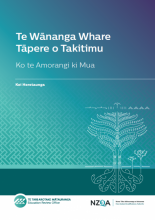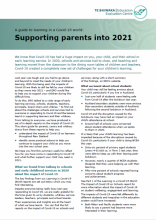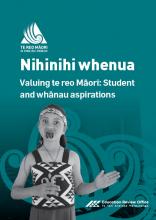- Topics: Accelerated learning, Evaluation indicators, Guides for parents, Hauora, Māori Education Evaluation, Te Pou Mataaho | Evaluation and Research Māori
- Published: 08 Jul 2021
Te Kura Huanui : Ko ngā kura o ngā ara angitu
I roto i Te Kura Huanui: Ko ngā kura o ngā ara angitu, ko ngā uiui me ngā whānau Māori, kaiārahi, kaiako, kaimahi, kaumātua hoki e tūhura ana i te ngākau titikaha o ngā hapori ki te whakarauora, ki te whakapakari hoki i te reo Māori me ngā tikanga Māori mō ā rātou mokopuna, tamariki, uri whakatupu anō hoki.
- Published: 08 Jul 2021
Te Kura Huanui: The treasures of successful pathways
Te Kura Huanui: The treasures of successful pathways and supporting documentaries explore the Māori-medium education pathway, through a rich collection of interviews and research conducted in partnership with early founders, whānau, leaders, graduates, kaiako, kaimahi and kaumatua.
- Published: 12 Apr 2021
A guide for parents and whānau on supporting science in primary school
Learning science in the primary school years helps children become better problem solvers and critical thinkers. This short guide aims to help parents and whānau of children in primary school to understand why science matters for this age group, know what to expect for science teaching and learning for their child, and think about how they can support their child’s science learning journey.
- Published: 12 Apr 2021
A guide for parents and whānau on supporting science in early childhood
Learning science in the preschool years helps children become better problem solvers and critical thinkers. This short guide aims to help parents and whānau of children in early childhood education to understand why science matters for this age group, know what to expect for science teaching and learning for their child, and think about how they can support their child’s science learning journey.
- Published: 19 Jan 2021
A guide to learning in a Covid-19 world - Supporting parents into 2021
This short guide is for parents of children in early childhood education, and of school-aged children. It covers that we learnt from talking to schools and early childhood education services in 2020 about the impact of Covid-19. It also sets out some recommendations for how parents can continue to support their child’s learning this year.
- Published: 19 Jan 2021
Te Kahu Whakahaumaru – Ngā mahi a te rangai mātauranga Māori (English)
Te Pou Mataaho, ERO’s evaluation and research group, and Te Uepū ā Motu, ERO’s national evaluation and review team, pursued this evaluation to provide an evidence base about the initial impacts of Covid-19 on Māori-medium education and how the sector responded.
- Published: 19 Jan 2021
Te Kahu Whakahaumaru – Ngā mahi a te rangai mātauranga Māori (Māori)
I whāia tēnei arotake e Te Pou Mataaho, te rōpū arotake, rangahau hoki a Te Tari Arotake Mātauranga me Te Uepū ā-Motu, te rōpū arotake ā-motu a Te Tari Arotake Mātauranga, ki te whakaputa i tētahi kohinga taunakitanga e kitea ai ngā pānga tōmua o te Mate Korona ki te rāngai mātauranga reo Māori, me ngā rautaki i whāia ai e taua rāngai.
- Published: 10 Dec 2020
Te Kahu Whakahaumaru: Māori continue to show resilience across Māori-medium education
In Aotearoa, Māori-medium education experienced significant disruption when the outbreak of Covid-19 forced kura to close their doors, and whānau and kaiako to adjust to home schooling and distance learning. Among the many challenges were access to technology and resources with Māori communities among the most affected.
- Published: 10 Dec 2020
E whakatinana tonu nei te rāngai mātauranga reo Māori i te manawanui
I Aotearoa nei, i tino raru te rāngai mātauranga reo Māori i te horapatanga o te Mate Korona, i kati ai ngā tatau o ngā kura, i mate ai hoki ngā whānau me ngā kaiako ki te tīni i ā rātou mahi ki te whakaako ki te kāinga me te ako tawhiti.
Ko tētahi raru i roto i te huhua, ko te korenga o ngā taputapu matihiko me ngā rauemi, ka mutu ko ngā hapori Māori ērā i rongo i te korekore rawa atu nei.
- Published: 15 Sep 2020
Nihinihi Whenua – Valuing te reo Māori: Student and whānau aspirations
This report provides a snapshot of student and whānau perspectives on the teaching of te reo Māori. It follows the June publication of Te Tāmata Huaroa, which provides a review of the current status of te reo Māori in English medium school settings.
- Published: 18 Jun 2020
Te Tāmata Huaroa: Te Reo Māori in English-medium Schooling
This report gives a snapshot of the current provision of te reo Māori teaching and learning in a representative sample of English-medium primary and secondary schools. The education sector is seen as an important lever in the Government’s Maihi Karauna strategy for language revitalisation.
- Published: 14 May 2018
Teaching strategies that work - Reading
The Education Review Office (ERO) has released the latest in its Teaching Strategies that Work series. “Keeping children engaged and achieving in reading” is a description of strategies used by primary schools which have significantly improved their students’ achievement in reading.
- Published: 04 Sep 2017
Building resilience and self efficacy
Students acknowledge the role leaders and teachers play in instilling in them the self-belief to become confident, connected, actively involved, life long learners
- Published: 04 Sep 2017
Leadership for equity and excellence
The senior leadership team are responsible for specific portfolios and work interdependently to realise the shared vision of equity and excellence for all.
- Published: 04 Sep 2017
Leadership
Leadership engages in collaborative consideration of the evidence to inform a considered response to issues identified. Solutions are sought only after a thorough analysis of the problem and consideration of the evidence about what is likely to make the most difference. The implementation of new initiatives is closely evaluated.
- Published: 04 Sep 2017
Leadership: building effective teams
A principal describes the need to establish the ‘fertile ground for innovation’ by being explicit about the need to be ‘comfortable being uncomfortable’ in order that together they can question, inquire and critique to make things better the learners.
- Published: 04 Sep 2017
Learners contribute to curriculum design
Engaging in multiple strategies to elicit and respond to student voice ensures that students have direct input into curriculum design.
- Published: 04 Sep 2017
Learning-centred relationships: reading together
This school has implemented the Reading Together programme for many years. Leadership sees the value of the programme in building strong learning relationships with family and whanau and supporting emerging literacy.












